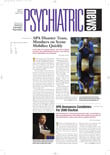Amid a steep decline in antidepressant prescriptions for children and adolescents since regulators mandated label warnings of possible links between the drugs and suicide risk, psychiatric organizations are urging the Food and Drug Administration (FDA) to track the impact on patients.
A September 2 letter from APA and the American Academy of Child and Adolescent Psychiatry (AACAP) alerted the FDA about a new analysis of data on antidepressant prescription patterns (Psychiatric News, September 2) and asked that the FDA monitor the impact of the black-box warning on antidepressants it issued on October 15, 2004.
The analysis, which was done by Psychiatric News reporter Jim Rosack, was based on a two-year dataset provided to Psychiatric News in August by NDC Health Inc. It revealed a swift and steep decline in antidepressant prescriptions dispensed to youth aged 18 and under.
The nearly 20 percent drop in the number of antidepressant prescriptions dispensed for minors is “a decline whose public health consequences are unknown and must be monitored by policymakers, physicians, parents, and patients,” said the letter, which was signed by APA President Steven Sharfstein, M.D., and AACAP President Richard Sarles, M.D., and sent to the FDA commissioner at the time, Lester Crawford, D.V.M., Ph.D.
“This dramatic shift raises the serious questions of whether those children and adolescents with depression who are no longer taking these medications are receiving any care at all—or are receiving the most effective care,” they wrote.
Among the information some child and adolescent psychiatry advocates are seeking is whether a corresponding increase has occurred in treatments such as cognitive-behavioral therapy and interpersonal therapy, which have proven effective with adults.
The prescription data tracked the drop in antidepressant use among adolescents to the first strong public health advisory from the FDA on the use of the drugs in youngsters in March 2004 (Psychiatric News, April 16, 2004). Another drop occurred in October 2004, the same month the FDA mandated a controversial black-box warning for antidepressants (Psychiatric News, November 5, 2004).
The black-box warning, which must appear on the labeling of all antidepressant medications distributed in the United States, stated that the drugs “increase the risk of suicidal thinking and behavior (suicidality) in children and adolescents with major depressive disorder (MDD) or other psychiatric disorders.”
The FDA did not return calls for comment on the APA letter, but an FDA official had previously told Psychiatric News that the agency“ has not systematically tracked antidepressant prescribing in the pediatric population since” the warning was added. That decision by the FDA came despite previous formal requests from both APA and the AMA.
APA first requested that the agency track the impact of the black-box warning on prescribing patterns on the same day the warnings were mandated. APA requested a tracking system to identify any increase in actions by patients to harm themselves as a result of reduced access to medically necessary treatment with antidepressants. AACAP and the AMA have made similar requests.
Thomas Laughren, M.D., acting director of the FDA Division of Psychiatry Products in the Center for Drug Evaluation and Research, told Psychiatric News in his initial response to the newspaper's data analysis that“ even tracking suicidal behavior in this population is not a failsafe approach to assessing the impact of this labeling change, because secular trends in such behavior are influenced by many different factors.”
In their letter, APA and AACAP pointed out that several studies, including the Treatment of Adolescents With Depression Study (TADS) funded by the National Institute of Mental Health, have shown combination treatment consisting of medication and talk therapy is the most effective for youngsters with depression. That course of treatment “would appear to be endangered by such a strong decline in the medication portion of therapy,” the letter emphasized.
“This shift is additionally disturbing to us because it comes at a time when we should be doing more to help children and adolescents with depression, not less,” Sharfstein and Sarles wrote, citing under-treatment of teenagers for depression as noted in “Mental Health: A Report of the Surgeon General,” published in 1999. “The biggest threat to a depressed young person's well-being is to receive no care at all,” they said.
The letter to the FDA from APA and AACAP is posted at<www.psych.org/news_room/press_releases/05-53APAonPsychNewsAnalysis%20_3_.pdf>.▪
